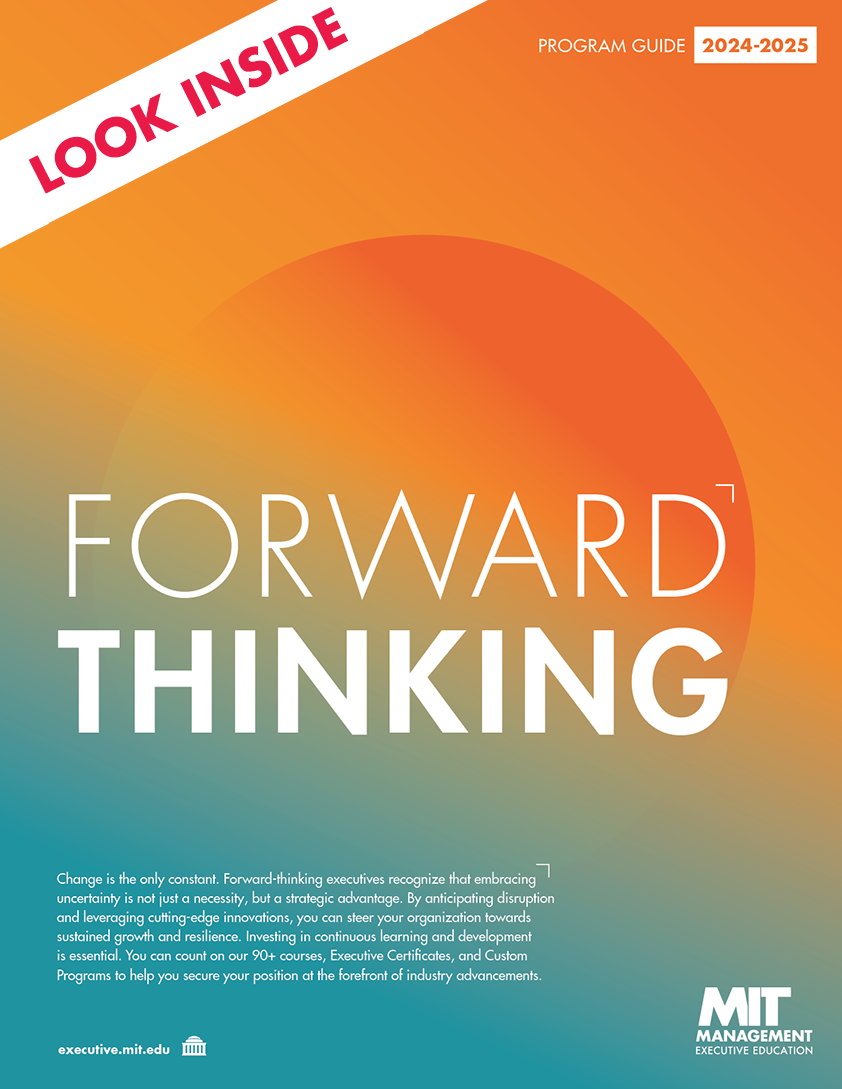Transportation is a leading culprit of greenhouse gas (GHG) emissions. A significant amount of these transportation-related GHG emissions is related to medium and heavy-duty vehicles. However, demand for freight is only going to increase due to increasingly globalized supply chains, just-in-time delivery, and the export of natural resources. Fleet businesses are increasingly tasked with transitioning to greener business models and prioritizing sustainability.
The minds at the Michelin Innovation Lab—an organization within the leading mobility company and tire manufacturer that develops ideas from concept to scale-up—are helping fleets become more fuel efficient. Raymond Cotton, Business Development Manager, and Adam Evens, Director, are behind Michelin’s GreenerFleets, a business focused on identifying pathways for reducing emissions while ensuring competitiveness of the sector. In 2022, Raymond and Adam attended the three-day MIT Sloan Executive Education course Disciplined Entrepreneurship: A Systematic Approach for Building Innovative Products and Ventures, with the goal of making GreenerFleets profitable and, ultimately, scalable.
“GreenerFleets is a comprehensive solution that combines consulting expertise, products, and services,” explains Adam. “Raymond and I attended Disciplined Entrepreneurship together to better understand GreenerFleets’ strengths and weaknesses and to explore what modifications we might need to make to the business model in order to grow.”
“It can take a long time to test and flesh out an innovation to see if it is truly viable. Attending external courses like this are a way to pressure test ideas quickly.”
Led by successful entrepreneurs Bill Aulet and Paul Cheek, Disciplined Entrepreneurship explores the framework outlined in Aulet’s award-winning and international best-selling book Disciplined Entrepreneurship: 24 Steps to a Successful Startup and explains in detail the strategy and tools used by successful startup founders and corporate teams to build new ventures. For Adam and Raymond, this three-day learning experience was the perfect opportunity to step away from their desks and reality-check their business among other entrepreneurs and intrapreneurs with diverse perspectives and business models.
“Raymond and I are very fortunate to have Michelin as our financial investor,” says Adam. “It can take a long time to test and flesh out an innovation to see if it is truly viable. Attending external courses like this are a way to pressure test ideas quickly. Basically, we’ve got to develop ideas, fail fast, reinvent ourselves, and continue to do that until we're viable.”
Raymond added that outside help can be beneficial “Corporations know their customer, they know the current product, they know the competition, and they are great at evolving offers. But startups are about creation. They are about big change. So, I think a lot of times it takes a step outside the company to catalyze those big changes.”
In addition to their learnings and takeaways from the course, one of the greatest benefits the program was attending it together.
“Raymond and I were pretty conscious of not sitting at the same table, to make sure that we were mixing with other participants and getting a good cross section of other discussions that could happen at the tables, but I can remember specific points in the class when the professors would say something that really resonated, and I would look across the room at Raymond and we would nod in agreement,” says Adam.
Of those many “aha” moments, Raymond recalls a key discussion about understanding how to pivot the business model around a set of core capabilities. The duo began to better understand was what and was not scalable for their business. “What is your core and how do you turn that core into a scalable offer? That was a critical and enlightening conversation for us.”
During the day-to-day grind of a startup, it can be challenging for a team to find the time and place to focus on strategy and reflect on the business. Most energy is spent on execution. Attending entrepreneurship programs as a team provides that much-needed opportunity to pull back and adjust.
“It’s a shame, but most people probably don't take enough time to self-reflect on what they're doing, because they just have to do it,” says Raymond. “So having the time with your team, where you're not just taking phones calls or conducting meetings, is very valuable to your offer. And adding the outside perspectives … it levels the playing field. Because not everyone comes in with the same experience or background. What you learn in that context is eye opening.”
Attending a course as a team also enables you to leave with a shared language for and understanding of the current business. “You come away with a more congruent sense of your strengths and weaknesses, and more alignment,” says Adam.
Ultimately, Adam and Raymond left the course with a different and now shared perspective on what a scalable offer meant for their company. “Disciplined Entrepreneurship emphasizes and re-emphasizes the point that you don't have a business if you don't have customers. Nothing says business like someone paying the check, right? A key takeaway for us was realizing it was important to, at that moment, abandon a very scalable offer for a very profitable small offer,” says Raymond.
Meanwhile, the business roadmap they drafted during the three-day course continues to serve them well. In fact, they refer to it often.
“Think of how much you would have to pay consultants to create that roadmap for you, and you’d likely never look at it again,” says Raymond. “In this case, we created it ourselves, presented it during the course, and received live feedback on it. I think it’s the most valuable thing you leave with.”
The GreenerFleets team is now ready for the next steps in their journey.
Disciplined Entrepreneurship: A Systematic Approach for Building Innovative Products and Ventures, a three-day course on campus, presents a step-by-step strategic road map for launching a successful venture or more efficiently bring innovative products and ideas to market. Learn the Disciplined Entrepreneurship framework through lectures, case studies, team exercises, and coaching from experienced entrepreneurs. Leave with a comprehensive view of how to make, market, and sell a product that people want to buy.








